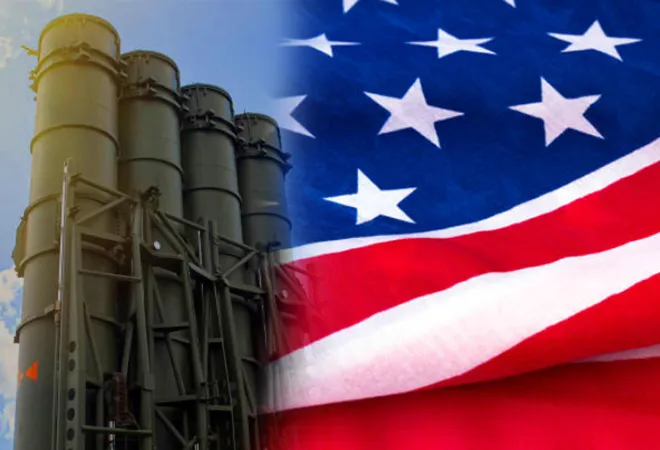
Last month, during a US House Armed Services Committee hearing, Assistant Defence Secretary Randall Schriver deemed India’s decision to purchase the Russian S-400 air defence system as “an unfortunate decision.” Schriver added, “We are very keen to see them (India) make an alternative choice… we’re working with them to provide potential alternatives.”
Despite the looming threat of secondary sanctions under the 2017 legislation Countering America’s Adversaries Through Sanctions Act (CAATSA) – which aims to punish countries that do business with Russian defence or intelligence sectors -- India inked the deal late last year. Since then, contention over the S-400 stood dampened as India hailed the decision to ink the deal despite the US pressure as a sign of New Delhi pursuing “an independent policy.” Whereas, the United States sought wiggle-room with its legislators providing provisions for waiver to India, Vietnam and Indonesia under Section 231 of CAATSA. Although, the waiver has to-date not been granted by President Donald Trump, the amendment was seen as making an exception for India in view of the promising long-term trajectory of Indo-US relations.
Schriver’s recent statement, however, may be seen as reigniting the contention over India’s purchase of five S-400 batteries worth around $5.43 billion. The answer to why the US is now once again raking up the issue with India may lie in the recent downturn in its relation with Turkey.
Turkey’s S-400 bid: The return of CAATSA threat for India?
In recent years, the US-Turkey relationship has been inching towards an inflection point. The same has been caused by differences over a range of issues like, the back-sliding of democratic norms under President Recep Tayyip Erdoğan, the extradition tussle over US-resident Fethullah Gulen, the imprisonment and release of American pastor Andrew Brunson, and Turkey’s arrest of employees of US consulates on charges of links to the Kurdistan Workers’ Party (PKK) – the Kurdish insurgency movement deemed terrorist by both the US and Turkey.
These issues have spurred American anxiety over Turkish conduct being that of a mere ally “on paper”. The latest point of contention has been Turkey’s plan to also purchase the S-400 missile defence system from Russia over the US-made Patriot Air Defence System. Given Turkey’s NATO-ally status, the US has viewed this move to potentially compromise the security of its F-35 stealth fighter jets – which Washington plans to sell to Ankara “as part of a European consortium.” The Trump administration has responded by suspending Turkey’s participation in the F-35 development programme – wherein Turkey-based companies “manufacture parts for all F-35 variants and customers.”
Certainly, Turkey and India occupy different positions in the American security calculus in two distinct regions. One is a NATO ally, the other is an evolving security partner. Turkey holds more relevance in near-term American goals like seeking post-conflict security guarantees for Syrian Kurds (People’s Protection Units, YPG) – the crucial US allies in the fight against ISIS, which, much to Erdoğan’s ire, stand affiliated to the PKK. Whereas, India hones the potential to be a central player in the long-term US interest of a “free and open” Indo-Pacific.
However, the recent sparring between Turkey and the US over the S-400 does spur parallels with India. Most crucially, it reignites the prospect of India being sanctioned under CAATSA, as a matter of further conveying American resolve to Turkey.
Suspending GSP trade benefits: Strong-arming via inciting domestic politics?
Another point of commonality in recent American foreign policy vis-à-vis India and Turkey is the Trump administration’s intended suspension of trade benefits under the Generalised System of Preferences (GSP) on grounds of the two “no longer” complying “with the statutory eligibility criteria”.
However, with the suspension of GSP benefits in case of Turkey, the Trump administration seems to be employing the lever of economic coercion. Many in the US foreign policy community have long argued for the US to rein-in Turkey by targeting its economy which stands as “Erdogan’s greatest domestic vulnerability”.
With India, the move has been seen as a result of the Trump administration’s frustration with continually stalled trade talks. However, the possibility of the suspension of GSP benefits also impacting India’s domestic political space, is all too real, as India is gearing up for its general elections in which the economy is sure to be a major political lightening rod.
In recognition of that untoward impact, Rep. George Holding (R-NC) in a letter to the US Trade Representative said, “It is my request that the administration postpone the termination of India's GSP eligibility and revisit this decision after India's general election. At that point, we would be free from the turmoil of politics and would be able to have a more productive conversation.” Holding, the co-chair of the India caucus in the US House of Representatives even went on to warn, “terminating their (India’s) eligibility now politicises these negotiations and undermines our chances for a successful outcome.”
India’s wayout: Go up the (Capitol) Hill
One may argue, the recent US re-invocation of the S-400 issue with India, maybe the Trump administration’s attempt to avoid exceptions for India being an irritant in its other foreign policy goals. Consider the case of North Korea. Even the two rounds of President Trump’s personality-centric approach with his North Korean counterpart Kim Jong-Un, have failed to yield substantial results. It is now increasingly apparent that North Korea has little inclination to completely denuclearise, adding much credence to Victor D. Cha’s “India-type deal” analysis.
Back in 2009, the former US Deputy Head of Delegation for the Six Party Talks wrote, the ideal outcome from North Korea’s standpoint is “a situation similar to the arrangement that the United States negotiated with India”. Wherein, much like the US-India civil nuclear energy agreement, North Korea could retain control “of a portion of their nuclear energy and weapons programs outside of international inspection.”
For India however, such exemptions stand central to her interests of gradually enhancing its “strategic alignment” with the US. Towards securing the same, India must intensify its efforts at the Capitol Hill – where India isn’t at the receiving end of Congressional strong-arming. Whereas, Turkey recently has faced vocal condemnation and tabling of punitive actions even at the hands of American legislators. (For instance, the Turkey International Financial Institutions Act.)
On CAATSA, President Trump has held off on granting a waiver to India with a cryptic response: “(India) will soon find out”. In making a case for a waiver, India must step-up efforts to court influential US legislators like Sen. Dan Sullivan (R-AK) who also is a member of the Senate Armed Services Committee. Sullivan has been a vocal advocate for acting on the “desire among lawmakers to find some way to manage India's past commitment to Russia and its defense relationships with that country”. One such possible way would be to pursue another legislative amendment of resting the authority to grant waivers with the US Secretary of State – known to have led the advocacy of instituting the waiver provision for India, instead of the US President. India must also emphasise that in-line with the spirit of the waiver provision amendment to gradually "wean" countries off Russian equipment, Moscow’s arms export to New Delhi has decreased by “a whopping 42 per cent between 2014-18.” Whereas, around the same period (2013-17), the US witnessed “a blazing growth in its arms exports to India, recording over 550% growth” relative to the previous five years.
On GSP, India must strongly endorse Rep. George Holding’s appeal ahead of the Congressional notification of suspension of GSP benefits taking effect in the coming days with a presidential proclamation. India must also underscore the invalidity of Trump’s suspension rationale of India being the third biggest economy and thus not needing any preferential treatment intended for developing countries. When in fact, India is “much poorer per capita income wise than Turkey.” In addition, in-line with Trump’s attention to correcting US trade deficits, US exports to India registered a 28 percent increase last year – decreasing Washington’s deficit with New Delhi from $22.9 billion in 2017 to $21.2 billion.
Thus, in summation, noting that India and Turkey both stand in the US’ cross-hairs over the S-400 purchase and GSP trade benefits, India must guard its interests as Washington attempts to rein in Ankara.
The views expressed above belong to the author(s). ORF research and analyses now available on Telegram! Click here to access our curated content — blogs, longforms and interviews.




 PREV
PREV


